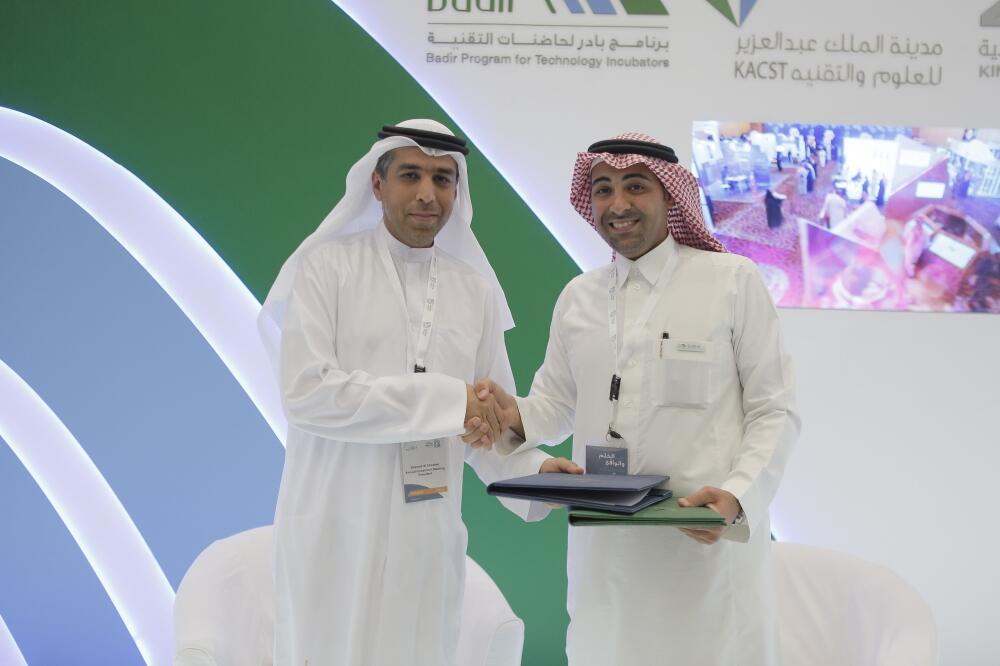DUBAI – AIM Startup – a major initiative by the UAE Ministry of Economy and part of the Annual Investment Meeting (AIM), an international investment conference in Dubai – has partnered with key Saudi Arabian institutions that will help spearhead entrepreneurship in the region.
Dawood Al Shezawi, Chief Executive Officer of AIM Startup, has signed a Memorandum of Understanding (MoU) with Osama Ashri, Head of Development and Strategic Alliances of Prince Mohammad Bin Salman College of Business that will see both organizations nurture the growth of entrepreneurship in the region.
Dawood Al Shezawi also signed a MoU with Nawaf Al Sahhaf, Chief Executive Officer of Badir Programme for Technology Incubators – KSA, confirming the programme’s participation as a ‘Gold Sponsor – Saudi of AIM Startup 2017-2018.
“Entrepreneurship is an important solution to the needs of the Arab youth and we have seen a major shift in government policies to empower the youth with the right tools so that they can become job creators, instead of becoming job-seekers,” Dawood Al Shezawi said, following the signing of the agreements.
“AIM Startup – with a theme of Technology for Sustainable Development and Inclusive Growth – is going to become the epicenter of entrepreneurship and start-up movement in the Arab World and the latest partnership with three key Saudi institutions will help us to strengthen the start-up movement in the region and help spearhead youth employment.”
AIM Startup is a platform where disruptive startups from across the world gather to present their groundbreaking products or services on a truly global stage. AIM Startup was launched in 2017 as an initiative of the UAE Ministry of Economy to connect promising startups with investors and business partners from other parts of the world.
Set in the heart of the UAE’s Annual Investment Meeting, the World’s Leading FDI Platform for Emerging Markets and held under the patronage of Sheikh Mohammed Bin Rashid Al Maktoum, UAE Vice President, Prime Minister and Ruler of Dubai.
This year, 200 promising startups will convene under one roof to meet with investors, corporates, government representatives and industry experts and will be given the opportunity to demo their groundbreaking solutions to a global audience of more than 20,000 people.
“Our deals to partner with three Saudi Arabian institutions are aimed at supporting the public sector initiatives with private sector participation and help the development of a healthy entrepreneurship eco-system that will continue to develop and help fund start-ups and create new tech-based employment,” Dawood Al Shezawi said.
The number of start-ups in the MENA region spiked during the early 2000s with more than 150 initiatives by business incubators and non-profit organizations able to provide support services to aspiring entrepreneurs. In fact, for technology start-ups alone, more than 450 deals in the MENA region received a total investment of $750 million between 2013 and 2015, according to the State of Digital Investment in MENA report published in 2016.
A World Economic Forum report said “Middle Eastern cities have a long way to go before they can compete with leading global start-up hubs.” Not a single Arab nation featured in The Global Startup Genome Ecosystem Report 2017, a survey which ranks global cities according to their ability to create environments in which start-ups thrive.
“The good news is there is plenty of room for growth: Just 8 per cent of businesses in MENA have a digital presence, as compared to 80 per cent in the United States, while 1.5 per cent of MENA’s retail sales are transacted digitally. The digital market is estimated to add $95 billion in annual GDP by 2020, with each digital job creating 2-4 more jobs in the economy.”
AIM Startup’s initiatives will help increase the number of Arab entrepreneurs – who will create employment and help absorb millions of young men and women waiting to be hired in the GCC and the wider MENA region.
Recent research by the Magnitt – a large startup facilitator – found the region now has over 3,000 startups and looked more closely at the founders of MENA’s top 100 funded startups.
It estimates there has been more than $870 million in startup investment last year. It found that the top 100 startups together have raised over $1.42 billion in funding and each startup has raised more than $500,000 individually.
It also found that on average, founders of the top 100 startups in the MENA region have 9 years of experience before starting. Some 40 percent of startups were created by sole founders and 39 per cent have two co-founders. In terms of diversity, 12 per cent of successful founders are female in comparison to 15 percent in the EU and 17 percent in the US. It also found the UAE hosts 50 percent of MENA’s top funded startups.
Some 68 percent of MENA startup founders originate from the Middle East, despite many having dual citizenship. In terms of origin, 38 percent of MENA’s 100 startup founders are from Lebanon and Jordan with only 16 per cent of startups headquartered there. That betrays something else: Dubai has become the Delaware of the Middle East, with actual HQs and development teams elsewhere.
“With world population nearing 9 billion by 2025, sustainability should be at the heart of every conversation today. With world hunger, poverty, water scarcity, wasteful consumption, climate degradation and inequality threatening the very fabric of our social, environmental and economic well-being, now is the time to get actively involved if we wish to create the future that we desire,” Dawood Al Shezawi noted
Source: http://bit.ly/2wRcrm6











